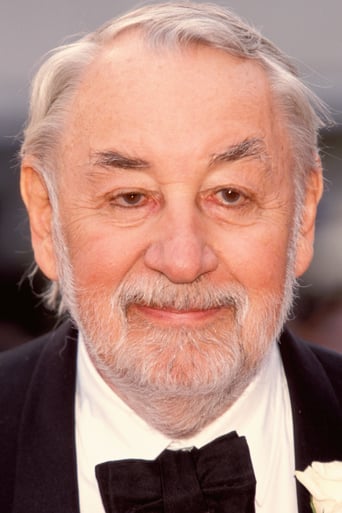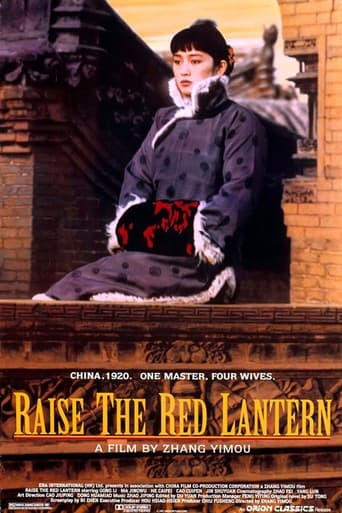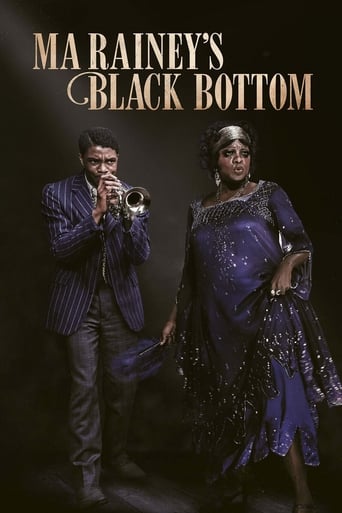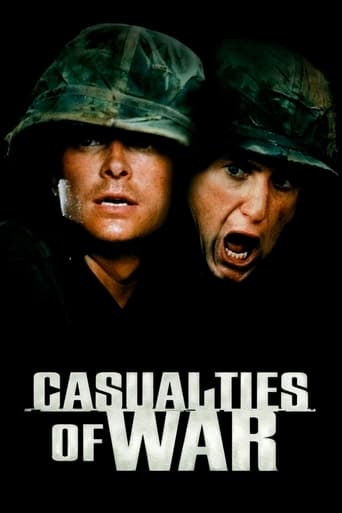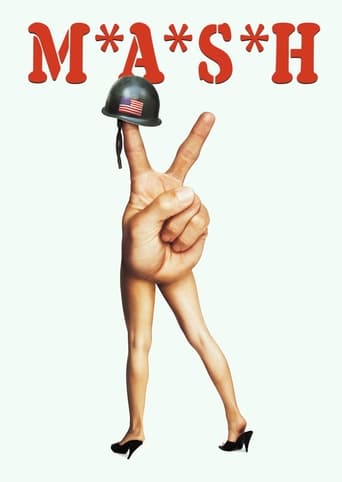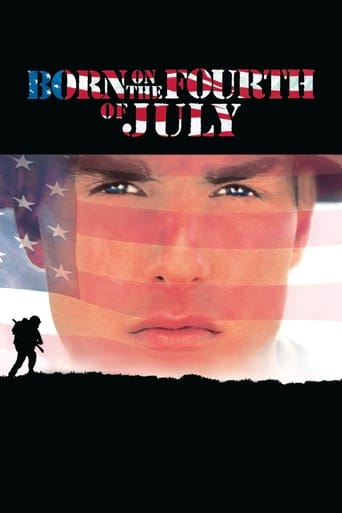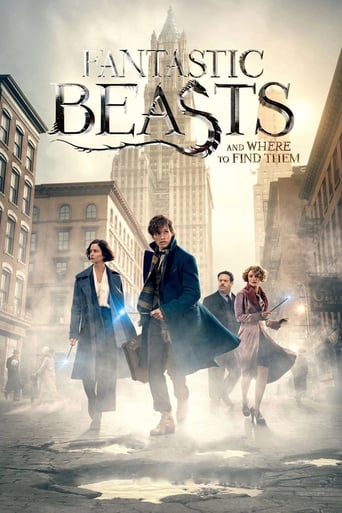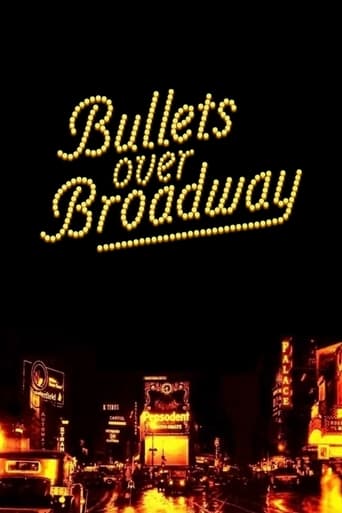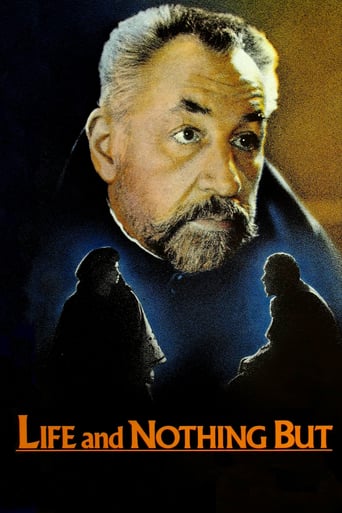
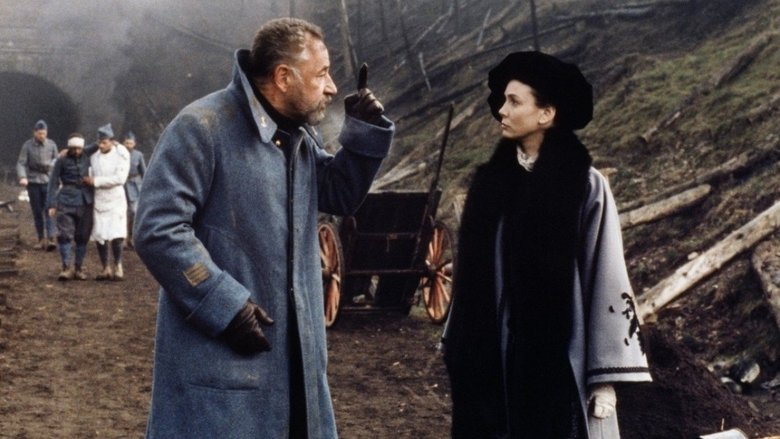
Life and Nothing But (1989)
January, 1920. 350,000 French soldiers remain missing in action. Major Dellaplane tirelessly matches the dead and the wounded with families' descriptions. Honor and ethics drive him; he hates the idea of "the unknown soldier." Into his sector, looking for her husband, comes a haughty, politically connected Parisian, Madame Irène de Courtil. Brusquely, Dellaplane offers her 1/350,000th of his time, but as their paths cross and she sees his courage and resolve, feelings change. After he finds a surprising connection between her missing husband and a local teacher, Irène makes Dellaplane an offer. This man of action hesitates: has he missed his only chance?
Watch Trailer
Cast


Similar titles
Reviews
When I saw this movie at the Montreal Film Festival, I was impressed by this contemplative movie. Like any contemplation, it sees everything about human nature and subtly refers to it. No flash, no gadgets, no lectures, just the plain vision of things as they are. He just lets you to be the judge of things. Then, I became a great fan of Tavernier's movies. This movie occupied my mind for ever after and never left me. This movie also confirmed how useless and dreadful this war was, and maybe how ridiculous most wars are. Perhaps my favourite movie ever. Anyway, a must see.This movie has a sequel called Captain Conan which also shows Tavernier's prowess in making art and intelligent cinema where a lot of characters are involved and seem so natural.
There are at least five stories in Life and Nothing But, and most of them could make a movie in themselves. There is the story of Major Delaplane (Philippe Noiret) who in 1920 has the task of trying to identify the 350,000 French soldiers who remain on the missing roles. There is the story of the hypocrisy behind the choosing of an unknown soldier who eventually will be buried with great pomp and honors beneath the Arc de Triomphe. There is the story of Irene de Courtil (Sabine Azema), married to a missing soldier who comes from a rich and privileged family. There is the story of Alice (Pascale Vignal) whose fiancée and lover was last seen in a battle where hundreds of soldiers were wounded or killed. And we have the story of the thousands of wives, parents, brothers and sisters of those 350,000 missing men who, nearly two years after the end of WWI, still have no idea of what happened to their men...are they alive, are they dead, are they horribly wounded, are they forgotten in some hospital or mental ward? Delaplane is an army officer who is consumed by his job of identifying the missing, of finding corpses and tracing who they were. His superiors think he is reckless and unreliable. The generals, the politicians and the industrialists want nothing more than to let the missing stay missing. That way bad decisions and pointless battles may escape notice, and protected factories can go back to business. Delaplane is even more cynical as he sees the rush to find the remains of an unidentified soldier to be honored in Paris. He has to deal with the aristocratic Madame de Courtil and with the schoolteacher, Alice. He is brusque and cynical, yet he is dedicated to finding and identifying every one of those 350,000 missing men that he possibly can. One long, outstanding sequence takes place in a huge, unstable railway tunnel. Toward the end of the war a train carrying munitions, gas shells, supplies and a car full of wounded soldiers entered the tunnel. The Germans in retreat had mined the place and it blew. Now, two years later and deep in the tunnel, Delaplane is trying to dig through the rubble, the unexploded gas shells and the torn tracks and find the car of bodies. In the field nearby relatives are waiting. Soldiers are sifting through dirt and rubble to find traces of bodies and belongings. Tables have been set up holding every manner of object which have been recovered so far, some matched with the bodies they were found on. People pass by the tables trying to find something that would tell them the fate of a loved one. They don't expect life; they just want closure. Tavernier holds these stories together thanks to the power of Philippe Noiret as Major Delaplane, to the power of outrage at what Delaplane is up against, and to a script which manages to combine sardonic humor with a look at what the bureaucracies of war do to the men who fight the wars. This is not a grim movie, but a poignant and sad one. "One patriotic song and off they go to war," says Irene de Courtil to Delaplane. They had been seated at a small restaurant where a black jazz band had been playing. Then a French woman came on stage and sang a song of how we can fight and then be comrades. The young soldiers all stood and joined in the song. So did Delaplane. "It's a club," she says fiercely to Delaplane. "It will be a club for years to come, this club of those who won the war. And the losing side will have its club, too. You know why I think of clubs? Because women aren't admitted! Nothing scares you men more than women, their wombs, their courage, their watching eyes..." And yet, as a friend and sculptor points out to Delaplane, the remains of the war now mean great business. "It's the Golden Age, my friend," he says. "Nothing like it since the Greeks, since the cathedrals. Even mediocre artists have their hands full. A monument per village. Three hundred sculptors for 35,000 towns. Everybody wants his doughboy, his widow, his pyramid, his marble, bas-reliefs, inscriptions. It's a factory. Better than the Renaissance. It's the resurrection." "Thanks to our dead," says Delaplane. Eventually the stories come together. The unknown soldier is selected with pomp and cynicism. Says Delaplane, "Officials are reassured by the story of the unknown soldier. They had a million and a half men killed, and now we'll only think about this one." Delaplane discovers the fate and identity of Irene's husband and Alice's lover. There are some twists and turnings. While each major character either chooses or is forced to choose life, the future for Delaplane and Irene is indefinite. On balance, while I liked this movie a lot, there still are probably too many things going on for Tavernier to handle with complete success. Still, it's always a satisfying experience to see Philippe Noiret, with those shrewd eyes and bloodhound eye lids, take on a role of real substance.
Philippe Noiret plays a military bureaucrat who is meticulously trying to catalogue the casualties of WWI. He and two women cross paths during the excavation of a train that was buried in a tunnel by German explosives. This would make for a great existential movie, but it's all talk talk talk. The dialogue is endless, and, with the long running time, the whole picture seems that way, too. The film would be much more powerful if it demonstrated its themes more visually. Instead, the emotions come off as somewhat flatter than they deserve to be. The production is also poor; it feels like it was made for television. And the musical score is so weak it takes the film down a peg itself. It's still worth watching, but I think it really could have been a lot better.
It is the end of the first World War, in France. Major Delaplane (Noiret) is ferociously determined to insure no dead soldier remains anonymous, despite the pressure from military and political authorities to keep them buried as a "lot".He keeps scrupulous count of each and every "casualty" he finds, treating each dead man with the absolute and final equality attained in death: he refuses to put any extra effort in tracing a rich one faster than a poor one.When he meets a grieved, upper-class widow looking for her dead husband, this man and this woman's worlds are shaken. From their distant positions, they start a slow and respectful journey towards each other, and the power of life over destruction will prevail.As always with Bertrand Tavernier, the personal story of the characters is tightly woven into the political issues of the times, as it is for all of us, whether we realize and like it or not.This is a film that celebrates the power of the individual within society, not outside of it. It is good for the soul in these times of fatalism, cynicism and loss of hope in man's good will.If you like this film, do not miss Tavernier's other films, they are all excellent.


